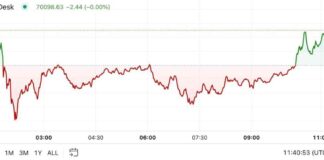A group of state attorneys general and the DeFi Education Fund have filed a lawsuit against the U.S. Securities and Exchange Commission (SEC) and its five commissioners. They claim that the SEC is overstepping its bounds by bringing enforcement actions against crypto exchanges. The lawsuit, filed in the U.S. District Court for the Eastern District of Kentucky, seeks to block the SEC from taking such actions, arguing that the agency’s “crypto policy” is unlawful and violates the Administrative Procedures Act.
The lawsuit argues that the SEC’s regulatory jurisdiction over digital assets is not justified, as these assets are not investment contracts covered by federal securities laws. The case comes at a time when Gary Gensler, the current SEC Chair appointed by President Biden, is expected to step down, with former President Donald Trump likely to appoint a more industry-friendly successor. The lawsuit also asserts that the SEC’s approach to crypto infringes on states’ rights to regulate the industry themselves.
The suit references the major questions doctrine, a Supreme Court precedent that prohibits federal agencies from litigating issues not specifically assigned to them by Congress. While some federal courts have rejected the application of this doctrine to SEC lawsuits against crypto companies, the plaintiffs in this case believe it is relevant.
Miller Whitehouse-Levine, CEO of DEF, stated that the lawsuit is aimed at challenging the SEC’s overreach and promoting the accessibility, efficiency, and consumer focus of the financial services and digital economy promised by DeFi and crypto technologies. The SEC declined to comment on the pending litigation but acknowledged the role of state securities regulators in uncovering and prosecuting misconduct in the crypto markets.
Kentucky Attorney General Russell Coleman emphasized that the lawsuit seeks to protect Kentuckians’ financial freedom and guard against inflation by preventing the federal government from interfering with their access to cryptocurrencies. He criticized the Biden-Harris Administration for cracking down on the cryptocurrency industry instead of encouraging its growth.
Earlier in the week, Gensler reiterated the SEC’s concerns about investor harm, speculative investing, and potential illicit activities associated with cryptocurrencies. He highlighted the need for sustainable use cases for crypto assets and expressed continuity in the SEC’s approach to the industry, following the lead of his predecessor, Jay Clayton.
Overall, the lawsuit reflects a growing tension between state authorities, industry advocates, and federal regulators over the appropriate scope of oversight and regulation in the rapidly evolving crypto space. As the legal battle unfolds, it will be interesting to see how the courts address the complex issues raised by the parties involved and how this could impact the future of crypto regulation in the United States.














